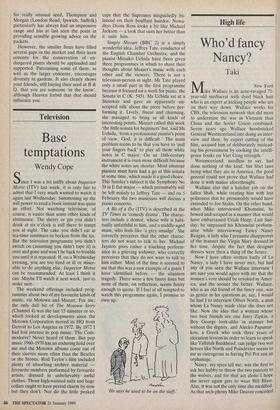Television
Base temptations
Wendy Cope
Since I was a bit sniffy about Inspector Morse (ITV) last week, it is only fair to admit that I very much wanted to watch it again last Wednesday. Summoning up the will power to read a book instead was quite an effort. Not watching television, of course, is easier than some other kinds of abstinence. The sherry or gin you didn't drink at six o'clock is still there to tempt you at eight. The cake you didn't eat at tea-time continues to beckon from the tin. But the television programme you didn't switch on (assuming you didn't tape it) is over and gone and won't be back to trouble you until it is repeated. If, on a Wednesday evening, you are too tired or ill or miser- able to do anything else, Inspector Morse can be recommended. At least I think it can. Maybe I'll watch it next week, just to make sure.
The weekend offerings included prog- rammes about two of my favourite kinds of music, viz Motown and Mozart. For me, the only dull bit of The Motown Story (Channel 4) was the last 15 minutes or so, which looked at developments since the Motown Corporation moved its HQ from Detroit to Los Angeles in 1972. By 1972 I had lost interest in pop music. The Com- modores? Never heard of them. But pop music 1960-1970 has an enduring hold over me and the Motown albums come out of their sleeves more often than the Beatles or the Stones. Rod Taylor's film included plenty of absorbing archive material — favourite numbers performed by favourite artists, dressed in unbelievably awful clothes. Those high-waisted suits and huge collars ought to have period charm by now but they don't. Nor do the little peaked
caps that the Supremes misguidedly ba- lanced on their bouffant hairdos. Nowa- days Diana Ross looks a bit like Michael Jackson — a look that suits her better than it suits him.
Simply Mozart (BBC 2) is a simply wonderful idea. Jeffrey Tate, conductor of the English Chamber Orchestra, and the pianist Mitsuko Uchida have been given three programmes in which to share their thoughts about Mozart's music with each other and the viewers. There is not a television-person in sight. Mr Tate played only a small part in the first programme because it focused on a work for piano, the Sonata in C (K. 545). Ms Uchida sat at a Steinway and gave an apparently un- scripted talk about the piece before per- forming it. Lively, fluent and charming, she managed to bring in all kinds of interesting points. Mozart called this work 'the little sonata for beginners' but, said Ms Uchida, 'from a professional pianist's point of view, God, it is difficult.' The main problem seems to be that you have to 'pull your fingers back' to play all those white notes in C major. On an 18th-century instrument it is even more difficult because the white notes are shorter. Most amateur pianists must have hada go at this sonata at some time, which made it a good choice. This Sunday's subject is the Symphony No 39 in E flat major — which presumably will be left mainly to Jeffrey Tate — and on 5 February the two musicians will discuss a piano concerto.
A Bit of a Do (ITV) is described in the TV Times as 'comedy drama'. The charac- ters include a dentist, whose wife is habi- tually unfaithful to him, and a middle-aged mum, who feels like 'a grey smudge'. She correctly perceives that the other charac- ters do not want to talk to her. Michael Jayston gives rather a touching perform- ance as a grieving widower, who correctly perceives that they do not want to talk to him either. Most of the time it seemed to me that this was a new example of a genre I have identified before — the situation tragedy. There were a few funny lines but none of them, on reflection, seems funny enough to quote. If I feel at all tempted to watch this programme again, I promise to own up.
He says he used to be on the staff'


























































 Previous page
Previous page